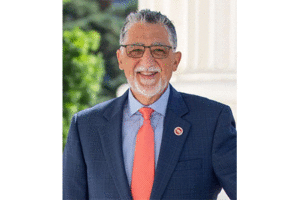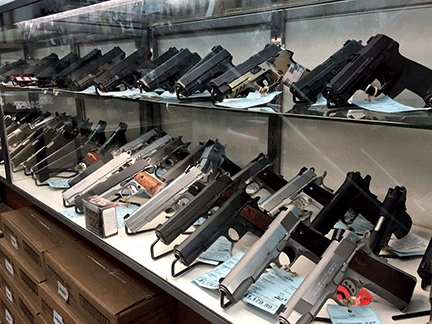On Wednesday, a bill that would have strengthened California’s conceal-carry laws failed to pass out of the State Assembly—this bill was in response to the Supreme Court decision expanding rights to carry firearms in public.
The bill failed three times in the State Assembly.
- Aug 25: 51-17 with 12 no votes on record.
- Aug. 30: 52-21 vote with 7 no votes of record,
- Sept. 1: failed for the third time in a 53-23 vote. It failed by 1 vote as an urgency clause was placed on the bill requiring it to pass by 2/3 vote.
 Senate Bill 918, authored by Senator Anthony J. Portantino (D – La Cañada Flintridge).
Senate Bill 918, authored by Senator Anthony J. Portantino (D – La Cañada Flintridge).
Specifically, SB 918 would address four areas:
- Licensing Regime: requires the licensing authority to determine whether the applicant is qualified based on defined criteria. The bill will provide a mechanism for establishing a standardized CCW application to be used statewide; applicants would be required to list all prior arrests, criminal convictions, restraining or protective orders, as well as references and would be required to attend in-person interviews.
- Age Restrictions: sets the minimum age to obtain a CCW license at 21. The age limit will align the CCW licensing process with other gun safety laws, such as the minimum age to purchase a handgun.
- Gun Storage & Training: imposes new gun storage and training requirements for anyone who obtains or renews a permit to carry a firearm in public. The bill will limit all CCW licensees to carrying no more than two firearms at any given time in public.
- Sensitive Places: limits the places in which CCW licensees will be authorized to carry firearms in public. Under the bill, certain sensitive places will be designated as off-limits for firearms, including school grounds, community colleges, colleges, or university grounds, government and judicial buildings, medical facilities, public transportation, any place where alcohol is sold and consumed, public parks and playgrounds, or special events that require a permit (such as demonstrations). These restrictions are consistent with the Supreme Court’s decision in Bruen, which recognized that states may limit the carrying of firearms in certain sensitive places.
How they voted on Sept. 1:
- Yes: Aguiar-Curry, Alvarez, Bauer-Kahan, Bennett, Berman, Bloom, Boerner Horvath, Mia Bonta, Bryan, Calderon, Carrillo, Cervantes, Daly, Mike Fong, Friedman, Gabriel, Cristina Garcia, Eduardo Garcia, Gipson, Grayson, Haney, Holden, Irwin, Jones-Sawyer, Kalra, Lee, Levine, Low, Maienschein, McCarty, McKinnor, Medina, Mullin, Muratsuchi, Nazarian, Petrie-Norris, Quirk, Quirk-Silva, Reyes, Luz Rivas, Robert Rivas, Rodriguez, Blanca Rubio, Santiago, Stone, Ting, Villapudua, Ward, Akilah Weber, Wicks, Wilson, Wood, Rendon
- No: Bigelow, Chen, Choi, Cooley, Cunningham, Megan Dahle, Davies, Flora, Fong, Gallagher, Gray, Kiley, Lackey, Mathis, Mayes, Nguyen, Patterson, Salas, Seyarto, Smith, Valladares, Voepel, Waldron
- No Vote on Record: Arambula, Cooper, O’Donnell, Ramos
In July, Portantino’s said California needed to lead on gun safety and reform after the Supreme Court’s decision.
“In the wake of the Texas tragedy and the continued threat of mass shootings, it’s a moral imperative that California leads on the issue of gun safety and reform,” stated Senator Portantino. “I am proud to be working with Attorney General Bonta and Governor Newsom on SB 918 and greatly appreciate the support this morning from Senator Feinstein and Senator Padilla. This is critical legislation to strengthen our existing concealed carry laws and ensure every Californian is safe from gun violence. We must be diligent in addressing the gun violence epidemic in our country and concealed carry laws are a key component of this effort.”
The Supreme Court in the New York Rifle and Pistol Association v. Bruen recently decided that licensing schemes requiring an applicant for a concealed carry license to show good cause (or something similar) to carry firearms are unconstitutional. SB 918 is California’s legislative response to the court’s ruling and would establish a more uniform and effective licensing process throughout the state.
Attorney General Bonta reminds Californians that carrying a loaded firearm (whether openly or concealed) in most public places is generally prohibited unless a person has been issued a license obtained by applying through local law enforcement.
In the June opinion, the Court held that New York’s law requiring an applicant for a concealed weapon (CCW) license to show “proper cause” in order to secure a license violates the Second Amendment. California similarly requires applicants for licenses to carry firearms in public to show “good cause,” and is likely unconstitutional under Bruen. But other requirements remain intact. Individuals may obtain a permit through a sheriff or chief of police after: a successful background check, the completion of a firearms safety course, and proof of residency, employment, or business in the county or city within the county. These laws were created and passed with the unique needs of Californians in mind.
Gun violence remains a growing threat to public safety throughout the nation. On average, there are over 110 gun deaths each day and nearly 41,000 each year in the U.S. Guns are the leading cause of death among children and adolescents; with U.S. children being more likely to die from gun violence than in any other comparable country.
California continues its efforts to advance laws and policies that save lives and prevent gun deaths. In 2021, California saw a 37% lower gun death rate than the national average. According to the CDC, California’s gun death rate was the 44th lowest in the nation, with 8.5 gun deaths per 100,000 people – compared to 13.7 deaths per 100,000 nationally, 28.6 in Mississippi, 20.7 in Oklahoma, and 14.2 in Texas. California’s gun death rate for children is also lower than other states, and is 58% lower than the national average.
Attorney General Bonta stands with partners throughout the state to continue preventing gun violence strategically and aggressively by:
- Advocating for commonsense gun laws including by sponsoring Assembly Bill 1594 to increase accountability for the firearm industry, working to strengthen federal laws to protect the public from ghost guns, and successfully defending California’s laws to prevent gun violence;
- Seizing guns from prohibited persons in the Armed and Prohibited Persons System, and through multiagency sweeps in the Bay Area and Los Angeles County, conducting operations targeting individuals attempting to illegally purchase guns, and collaborating with local law enforcement partners;
- Ending the sale of illegal firearms through litigation against ghost gun retailers, and by putting a stop to the sale of illegal assault weapons in Orange County; and
- Improving transparency by expanding gun violence-related data the California Department of Justice releases to researchers.

